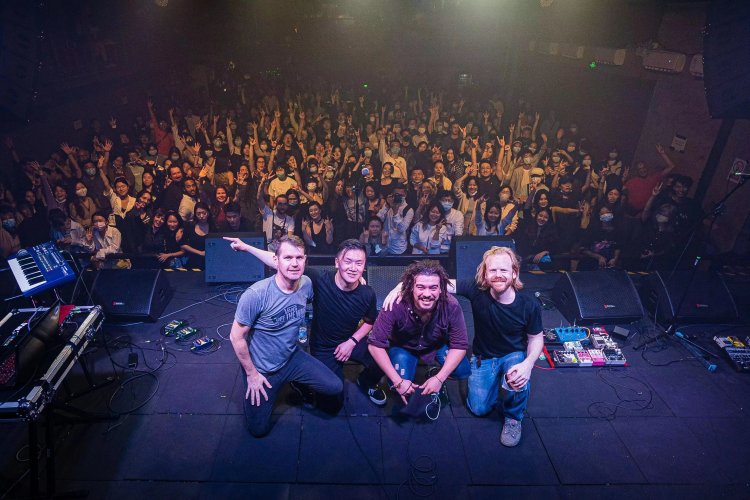Shanghai's Shoegaze Wunderkinds, RUBUR, Get Cosmic at Yue Space, Sep 25
It’s no great revelation to find that a band’s second or third album is stronger than their previous releases. The longer members jam together and play shows the more chemistry develops and things begin to gel. Such is the nature of practice, obviously. What makes RUBUR’s newest release, Persephone’s Seasons – their third full-length, and second for label Ruby Eyes Records – so astonishing, however, is that 2019’s Evening Sitdown Vision and 2016’s True Bypass didn’t seem to be missing anything. Both records are eloquent love letters to their shoegaze and dream pop forbears and are performed with a confidence usually reserved for veteran acts who have years of national tours, studio time, and headline bills under their belt.
And yet, the first time I listened to Persephone’s Seasons, I realized that the band hadn’t even begun to scratch the surface of their potential and that they had entirely redefined what I already thought was a perfectly executed sound. Simply put, Persephone’s Seasons is the record that I didn’t know RUBUR needed until they delivered, and the result has, in no uncertain terms, solidified these Shanghai shoegazers as one of the genre’s finest torchbearers to date.
I spoke with the band ahead of their Yue Space show this Friday, Sep 25, about their philosophical underpinnings, working with Cult of Luna's Magnus Lindberg, and finding their voice. (Spolier alert: they still don't think they have, but in my opinion, the sheer strength of Persephone's Seasons begs to differ. Critics always know best, right?)

First and foremost, congrats on the release of Persephone’s Seasons! How does it feel to get it out into the world? What has the reception been like?
We’re very happy that it’s finally finished.
Maojia: Personally, I always feel that when an album is finally released, I no longer have a relationship with it. Time to move onto the next thing.
Given that this is 2020, it has to be asked: Did COVID-19 affect the writing or recording process at all? Likewise, did it influence the songs, either lyrically or in terms of the overall mood and atmosphere?
The main recordings of this record were completed in early 2019, and the songs themselves were created in 2018. But for the music production process, it was affected. As a result, the mixing process, which otherwise had more than enough time, totally stalled. Not to mention, this epidemic may have had a potential psychological impact on everyone.
Guagua: Another particularly obvious influence is in the music video and vision for “Circular Ward.” In fact, the inspiration for Circular Ward's music video came from a dream I had during the epidemic. As the director of the video, I actually chose to paint a few scenes from my dream for it and then collaborated with a visual 3D artist to bring them to life. Basically, because of this psychological emotion stemming from the virus, certain aspects of perception are heightened, which is what we tried to capture in the music video. (Click here to watch the video on YouTube.)
We were chatting (outside this interview) and you mentioned that RUBUR has played one show this year, which was an opportunity to debut some of the new material. How did it go? Did you feel compelled to rework any of the tunes after that show?
We didn’t necessarily tell the audience these were new songs. Without introducing them as such, we just sort of played them through. Afterward, we watched through the videos of those songs, taking note of the arrangement and performance. However, as LiveCNMusic's Will Griffith noticed, at the time of the performance the album had already been mastered, so there was no room for modification. Many bands will perform new songs before officially releasing them, and it is difficult to decide whether you should tell the audience that they’re new songs or not. Basically, it’s just an exercise in self-experimentation.
What strikes me about Persephone’s Seasons is the album’s sonic cohesion, it really sounds like the band found its voice, and there’s a unified chemistry throughout. Which is to say, Evening Sitdown Vision sounds exploratory, and Persephone’s Seasons sounds grounded in a singular thesis. Was there a different set of principles guiding this record?
We’re always exploring, both instrumentally and with our sound, no one album has ever been an exception. To be honest, there is no deliberate adjustment to the creative method, but the members themselves have changed more or less, so the music has also changed to a certain extent. We think there is still some way to go to find our own voice.

Following up on that, Persephone’s Seasons has an extremely large and rich sound. Much of the production team on this record differed from the last one, including mastering by Cult of Luna’s Magnus Lindberg. How did that impact the finished product? Now that it’s all said and done, how do you think Evening Sitdown Vision differs from Persephone’s Seasons?
What we really enjoy about this album is that the music incorporates more elements and feelings that resonate with us. It is interesting that the same is true in production, so the final presentation is definitely richer than the previous one. Being able to compare the two in their entirety may also contribute to this.
We like Cult of Luna’s music and some bands that Magnus has produced. When he first heard the mix, he said that he thought our songs could benefit from a bit more "body" and bottom end than the shoegaze references we sent. I feel he was quite right.
In terms of the albums’ concepts, the two are actually connected. Evening Sitdown Vision emanates from a time period that exists every day and also exists in eternity, while Persephone’s Seasons emanates from a "moment" that people believe determines the eternal law.
RUBUR has always been an intellectually curious band, drawing on myriad references to poetry, philosophy, and now – with the release of Persephone’s Seasons – Greek mythology. What is it about these universal themes that speak to RUBUR’s ethos? Do you see any similarities between the palatial, near limitless sonic expanse of shoegaze, and the fact that these cultural icons – excuse the pun – reverberate throughout time and space?
As a band, we naturally hope to use music for self-expression, but the connection between the spirit and the source of inspiration of music may need to be expressed through this content. If music is the externalization of our inner emotions, then the content of literature, philosophy, etc. is the externalization of externalizing (but it cannot be truly externalized, so for many people, seeing these words makes the content expressed more abstract).
In fact, shoegaze, as a genre of music, is more like describing the performance and auditory experience from the beginning. Therefore, there are actually thousands of opinions about what kind of music shoegaze is. When we were making music, we never imagined a label that we would need to put on it, but did it out of subjective, "I like this expression.”
Maojia: From my personal point of view, I think shoegaze music is more restrained at its emotional core. It has this kind of introverted sound, opposed to strongly stimulating verbal expression, which probably unconsciously permeates our music, lyrics, images, videos, and designs.
Lastly, you’re playing Yue Space in Beijing on Friday (Sep 25). Anything you hope to do, see, eat, etc. before the gig?
Hope to meet old friends and new friends who we have not yet met.
Stream all of RUBUR's music on here.
And check them out at Yue Space on Friday, Sep 25. Tickets run RMB 100, and can be purchased here. Show starts at 8.30pm.
READ: On the Record: Backspace and Disparate Sensibilities
Images: courtesy of RUBUR



